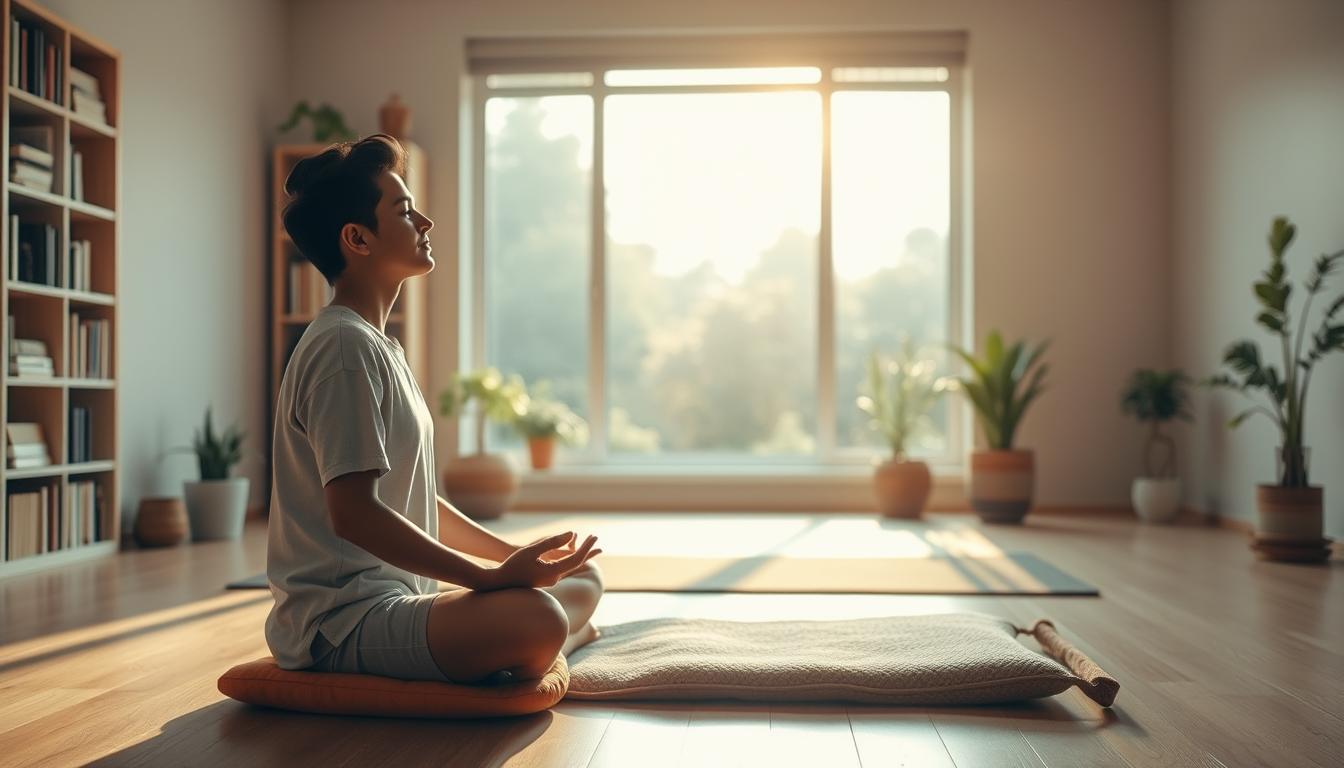Modern life often feels like a race against time. Deadlines, responsibilities, and constant connectivity can leave you mentally drained. But what if there was a way to quiet the noise and regain balance? Meditation offers a science-backed path to manage daily pressures while boosting your psychological well-being.
Your body’s natural response to challenges isn’t designed for nonstop activation. Chronic tension impacts everything from sleep to focus. Research shows practices like mindfulness create space between you and overwhelming emotions, helping break the cycle of anxiety.
You don’t need hours of silence to benefit. Even short sessions can rewire how your brain handles difficult situations. Pairing meditation with exercise or nutritious meals builds a holistic foundation for long-term health. This guide will show you practical methods tailored to busy schedules.
Key Takeaways
- Meditation helps manage daily pressures through mindfulness techniques
- Chronic tension affects both physical and psychological well-being
- Short sessions can create measurable changes in stress response
- Combining meditation with healthy habits amplifies benefits
- Adaptable practices fit into any lifestyle or experience level
Understanding Stress: The Toll on Your Body and Mind
Stress isn’t just a feeling—it’s a full-body experience with real consequences. When left unchecked, it triggers physical reactions that ripple through your systems. You might notice jaw clenching during work deadlines or stomach discomfort before major events. These are your body’s warning signals.
Physical Symptoms and Health Risks
Your muscles often bear the brunt first. Tight shoulders, headaches, and fatigue become routine. Over time, chronic tension can escalate to:
- High blood pressure from constant cardiovascular strain
- Digestive problems like irritable bowel syndrome
- Weakened immunity leading to frequent colds
Research links prolonged stress to serious health conditions. Heart disease risk increases by 40% in adults with unmanaged tension, according to American Heart Association data.
Mental and Behavioral Impacts
The mind-body connection works both ways. Emotional symptoms often include racing thoughts, irritability, or difficulty concentrating. Many people develop unhealthy habits like:
- Overeating or skipping meals
- Insomnia or restless sleep patterns
- Withdrawing from social activities
These changes create cycles that amplify discomfort. Recognizing early signs helps you intervene before chronic stress reshapes your daily life.
Meditation: A Powerful Tool to Reduce Stress
Your nervous system acts like a built-in alarm system, constantly scanning for threats. When overwhelmed, it triggers fight-or-flight responses that strain your body and mind. Meditation helps reset this mechanism through intentional focus, creating space between reactions and thoughtful responses.
Rewiring Your Body’s Natural Responses
Regular practice activates the parasympathetic nervous system—your “rest and digest” mode. This process:
- Lowers cortisol production by up to 30% (per Johns Hopkins studies)
- Slows heart rate through controlled breathing patterns
- Boosts GABA levels to stabilize mood naturally
Even 10-minute sessions strengthen neural pathways in the prefrontal cortex. This brain region governs emotional regulation, helping you handle challenges calmly.
Evidence-Based Improvements
Research reveals measurable changes in meditators’ health markers. A 2023 Harvard review found:
- 14% reduction in blood pressure after 8 weeks of mindfulness practice
- 31% fewer anxiety symptoms compared to control groups
These benefits compound over time. Pairing meditation with movement practices like yoga enhances mind-body coordination, creating lasting resilience against life’s demands.
Simple Meditation Techniques to Enhance Mental Health
Finding calm in daily chaos doesn’t require hours of silence—just simple tools you already possess. Start with bite-sized practices that fit between meetings or household tasks. These methods build resilience while strengthening your mind-body connection.
Mindfulness and Guided Meditation
Begin by focusing on your breath for two minutes. Notice air moving through your nostrils without judging distractions. Apps like Headspace or Calm offer structured sessions for beginners, with voice guidance to keep you anchored.
Guided visualization works well when thoughts feel overwhelming. Imagine a peaceful scene—a forest path or quiet beach—while listening to nature sounds. Therapists trained in mindfulness-based cognitive therapy (MBCT) often combine these techniques with practical coping strategies.
Integrating Meditation into Your Daily Routine
Pair short sessions with existing habits. Try three mindful breaths while waiting for coffee to brew or a 5-minute body scan before lunch. Consistency matters more than duration—even 90 seconds daily creates lasting change.
Struggling to stay focused? Set reminders on your phone or use mealtimes as cues. Research shows that regular practice improves concentration and emotional stability over time. As one study notes:
“Participants reported feeling 22% more grounded after just two weeks of brief daily sessions.”
Address challenges by adjusting your approach. If sitting still feels difficult, try walking meditation or stretching while focusing on bodily sensations. The key is finding what helps your mental health thrive within your unique schedule.
Integrating Physical Activity and Balanced Nutrition
Your daily choices in movement and meals shape how you handle life’s pressures. Combining intentional exercise with nourishing foods creates a shield against tension while boosting energy levels. Let’s explore how these habits work together to support your well-being.
Exercise and Its Role in Stress Management
Aerobic activity acts like a natural reset button for your system. Research with 185 university students showed two weekly sessions lowered perceived tension by 19% in six weeks. The CDC suggests 150 minutes of moderate movement weekly—think brisk walks or cycling—plus two strength-training days.
Nutrition plays an equally vital role. A 2022 review found diets high in processed foods increased emotional strain by 27%. Swapping sugary snacks for whole foods like berries, nuts, and fatty fish stabilizes energy and mood. One participant noted:
“Eating balanced meals helped me feel more equipped to handle work challenges.”
Physical activity isn’t limited to gyms. Try these enjoyable ways to move:
- Dance breaks during TV commercials
- Gardening on weekends
- Parking farther from store entrances
Pair these habits with meditation for amplified benefits. Your body gains strength through movement, while mindful eating reinforces healthier decision-making. Together, they build resilience against modern pressures.
Reducing Screen Time and Embracing Self-Care
Your smartphone’s glow might feel comforting, but its constant presence could be quietly draining your energy. A 2021 review found excessive device use spikes tension by disrupting sleep cycles and increasing cortisol. Late-night scrolling often replaces restorative rest, leaving you less equipped to handle daily pressures.
Self-care doesn’t require spa days or elaborate routines. Simple acts like brewing herbal tea or stretching for five minutes create pockets of calm. These moments help reset your mental health by shifting focus from digital noise to physical sensations.
Try these accessible ideas:
- Swap 15 minutes of social media time for a walk in nature
- Use app limits to protect wind-down hours before bed
- Pair device-free meals with mindful breathing exercises
Contrary to popular belief, prioritizing personal care isn’t selfish. As one therapist notes:
“Refilling your own cup first lets you show up fully for others.”
Start small by identifying one tech boundary and one nourishing activity daily. Track how these changes impact your mood and energy over three weeks. Many find this combination strengthens resilience better than drastic lifestyle overhauls.
Journaling, Caffeine Reduction, and Emotional Balance
Daily habits shape how you navigate challenges while maintaining inner stability. Two often-overlooked strategies—expressive writing and mindful caffeine consumption—offer tangible ways to support your mental health without drastic lifestyle changes.
Using Journaling to Process Emotions
Writing helps untangle thoughts that fuel tension. Studies show 10 minutes of daily journaling lowers cortisol levels by 12-15%. Start with simple prompts like:
- “What emotion feels heaviest today?”
- “When did I feel most grounded this week?”
Guided journals provide structure if blank pages feel intimidating. The Five-Minute Journal offers daily gratitude exercises, while therapy-based formats help identify recurring triggers. As one psychologist notes:
“Writing creates distance from overwhelming feelings, letting you respond instead of react.”
Smart Caffeine Habits for Calm Energy
While coffee boosts alertness, exceeding 400 mg daily (4-5 cups) often backfires. A 2021 review linked high intake to 23% higher anxiety rates and disrupted sleep cycles. Try these adjustments:
- Replace afternoon espresso with matcha (half the caffeine)
- Mix decaf with regular coffee gradually over two weeks
- Hydrate with lemon water between cups
Notice how changes affect your mood and focus. Many find herbal teas like chamomile or peppermint provide gentle energy without jitters. Track your intake for three days—you might discover hidden sources like soda or dark chocolate.
Building a Supportive Network and Creating Healthy Boundaries
Your relationships act as anchors during life’s storms. Research shows people with strong social connections experience 34% lower tension levels. A 2019 study of 163 young adults found those lacking support from family or partners faced higher emotional strain.
Start by nurturing existing bonds. Schedule regular check-ins with trusted friends—even brief calls matter. Join clubs or volunteer groups aligning with your values to build new connections. One book club member shared:
“Meeting others who love literature helped me feel understood during tough times.”
Setting limits protects your energy. Politely decline extra tasks when overwhelmed. Ask loved ones to call before visiting or set “no work emails after 7 PM” rules. These boundaries prevent resentment while maintaining closeness.
Try these practical steps:
- Identify three people who recharge your energy
- Practice saying “I need to focus on myself right now”
- Use calendar blocking to protect personal time
Your mental health thrives when you balance connection with self-care. As you strengthen supportive ties, you create space to handle challenges with renewed clarity.
Deep Breathing, Yoga, and Mindfulness Strategies
Your breath holds a hidden power to shift your entire state of being. When paired with intentional movement, these practices create a toolkit for managing tension while enhancing physical and emotional wellness. Let’s explore accessible methods backed by science.
Effective Breathing Exercises for Relaxation
Diaphragmatic breathing activates your body’s relaxation response. Sit comfortably and place one hand on your belly. Inhale deeply through your nose for 4 counts, feeling your abdomen rise. Exhale slowly for 6 counts. This technique:
- Lowers heart rate by stimulating the vagus nerve
- Improves oxygen flow to calm racing thoughts
- May also stabilize blood pressure over time
Alternate nostril breathing balances energy levels. Close your right nostril, inhale left for 4 counts. Switch sides and exhale for 8. Repeat 5 cycles. Studies show this reduces anxiety symptoms by 18% in regular practitioners.
Yoga and Mindful Practices to Boost Mood
Gentle yoga flows combine movement with breath awareness. Try cat-cow stretches each morning to release tension. Hold each pose for 3 breaths while focusing on bodily sensations. Research links daily yoga to:
- 23% improvement in mood regulation
- Better heart health through improved circulation
- Healthier responses to daily challenges
Pair these activities with mindfulness during routine tasks. Wash dishes while noticing water temperature, or walk while feeling each footstep. These small ways of staying present build resilience against life’s pressures.







